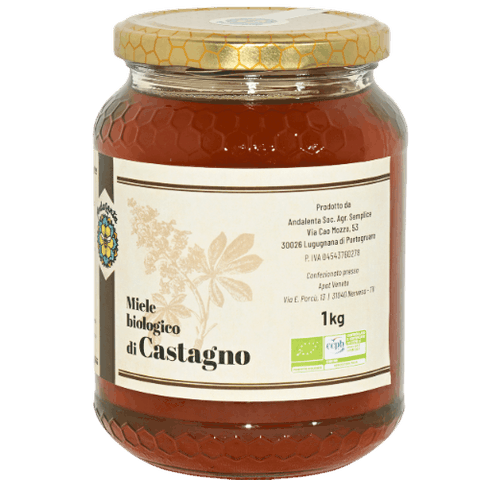Chestnut Honey
Chestnut Honey: Properties, Benefits, and Uses
Chestnut honey is a honey with a strong flavor, slightly bitter with a tannic aftertaste. It comes from the nectar of the flowers of Castanea sativa (chestnut tree) and is highly appreciated for its nutritional and beneficial properties.
🌿 Properties and Benefits
Rich in Minerals and Antioxidants
Contains iron, calcium, magnesium, manganese, and potassium.
High in polyphenols and flavonoids, excellent for heart health.
Powerful Antibacterial and Anti-inflammatory
Useful for sore throat, colds, and persistent cough.
Promotes the healing of wounds and internal inflammations.
Improves Blood Circulation
Excellent for those with venous and circulation problems, thanks to its vasodilatory effects.
Helps strengthen capillaries and reduce water retention.
Natural Digestive
Promotes digestion and stimulates the liver and bile.
Useful for abdominal bloating and constipation.
Energizing and Restorative
Perfect for athletes, students, and fatigued individuals.
Provides energy without causing excessive blood sugar spikes.
🍯 How to Use It
In Cooking
✔ Natural sweetener: Ideal for herbal teas and milk, but with a strong flavor.
✔ With aged cheeses: Perfect with parmesan, pecorino, gorgonzola, and taleggio.
✔ At breakfast: Great on bread, toast, or in yogurt.
✔ In desserts and marinades: Used in rustic cookies, cakes, and sauces for meat.
✔ In savory dishes: Excellent with roasts and sauces for game meat.
As a Natural Remedy
✔ For cough and sore throat: A teaspoon dissolved in hot water with lemon.
✔ For digestion: A teaspoon after meals helps the liver and intestinal transit.
✔ For circulation: Regular consumption improves vein and capillary health.
Chestnut honey is a honey with a strong flavor, slightly bitter with a tannic aftertaste. It comes from the nectar of the flowers of Castanea sativa (chestnut tree) and is highly appreciated for its nutritional and beneficial properties.
🌿 Properties and Benefits
Rich in Minerals and Antioxidants
Contains iron, calcium, magnesium, manganese, and potassium.
High in polyphenols and flavonoids, excellent for heart health.
Powerful Antibacterial and Anti-inflammatory
Useful for sore throat, colds, and persistent cough.
Promotes the healing of wounds and internal inflammations.
Improves Blood Circulation
Excellent for those with venous and circulation problems, thanks to its vasodilatory effects.
Helps strengthen capillaries and reduce water retention.
Natural Digestive
Promotes digestion and stimulates the liver and bile.
Useful for abdominal bloating and constipation.
Energizing and Restorative
Perfect for athletes, students, and fatigued individuals.
Provides energy without causing excessive blood sugar spikes.
🍯 How to Use It
In Cooking
✔ Natural sweetener: Ideal for herbal teas and milk, but with a strong flavor.
✔ With aged cheeses: Perfect with parmesan, pecorino, gorgonzola, and taleggio.
✔ At breakfast: Great on bread, toast, or in yogurt.
✔ In desserts and marinades: Used in rustic cookies, cakes, and sauces for meat.
✔ In savory dishes: Excellent with roasts and sauces for game meat.
As a Natural Remedy
✔ For cough and sore throat: A teaspoon dissolved in hot water with lemon.
✔ For digestion: A teaspoon after meals helps the liver and intestinal transit.
✔ For circulation: Regular consumption improves vein and capillary health.
